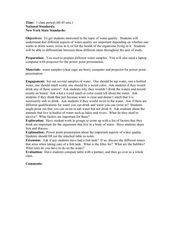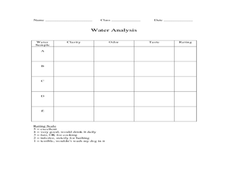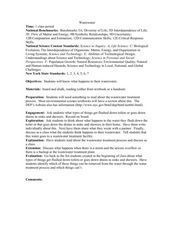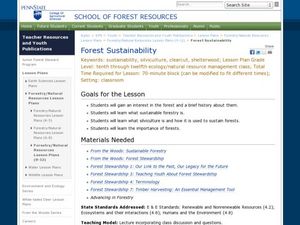Curated OER
Overpopulation
Young scholars examine population growth and how it impacts our environment. In this population instructional activity students identify the causes and consequences of overpopulation.
Curated OER
Is Our Water Healthy?
High schoolers test water for a least one chemical characteristic. They hypothesize how a storm event might change the chemical characteristics of a stream. Students collect water samples and use the chemical test to test the water.
Curated OER
Water Quality with Samples
Students recognize whether one wants to drink water, swim in it, or for the health of the organisms living in it. They prepare different water samples to observe and collect samples regarding the water quality.
Curated OER
Bottled Water vs. Tap Water
Students analyze the similarities and differences between tap water and bottled water. They make informed decisions about their use of each. Students are asked if they drink mostly tap water straight from the tap or water fountain. They...
Curated OER
Wastewater
Students discuss what happens to their wastewater. They read about the wastewater treatment process. Students are asked what types of things get flushed down toilets or goes down drains in sinks and showers. They are taught what happens...
Curated OER
Guided Reading Organizer for Chain Reaction
The class uses Chain Reaction, a magazine, to build a better understanding of Latin and Greek roots found in scientific vocabulary. They use two attached worksheets to help them read a scientific article, using visual clues and their...
Curated OER
Physiological Adaptations
Students investigate the concepts of genetics and how it is tied to the variations found within different species and how it is tied to adaptations. They review the theory of evolution and factors found to help create variation. The...
Curated OER
Great Rivers 2: The Ups and Downs of River Flooding
Second in a three-part instructional activity on rivers, this instructional activity focuses on the flooding that occurs in riparian locations. First, learners take a look at facts about the Amazon River. They read online materials and...
Curated OER
Dependence and Interdependence
Third graders explore the dependence and interdependence that plants and animals in every environment have on one another. They examine how plants and animals depend on each other for survival. Students complete a variety of experiments...
Curated OER
Beetle Collection and Release
Young scholars investigate plants and compare them to the purple loose strife. As they observe the plants they predict possible impacts on plant populations based on their observations. They work in groups and present their findings to...
Curated OER
Dissolved Oxygen and Photosynthesis: 1
Learners are taught that plants produce oxygen underwater, and they design an experiment that test this question. They discuss whether plants give off oxygen, and how to measure this. Students measure the increase in dissolved oxygen...
Curated OER
Wild Dog Debate
Students participate in a mock conference addressing the possible extinction of African wild dogs. In this wild dogs lesson plan, students state their arguments and ask questions about the issues they have researched.
Curated OER
Where in the world is the Hydra Electron?
Walk your class through the journey water takes once it leaves your kitchen sink, all the way through the water cycle. Demonstrations support your lecture. This plan is thoroughly written, but ideally you would follow it up with water...
Curated OER
Invasives and Macroinvertebrates
Students view macroinvertebrates, or discuss previous collection activity. They graph data on macroinvertebrates in the Hudson River. Students discuss the relationship between habitat, environmental changes, and invertebrate diversity or...
Curated OER
Forest Sustainability
High schoolers study major forests and their history. They see what sustainable forestry and silviculture is and discuss the topics on the attached worksheet.
Curated OER
Ecosystem Services - Water Purification
Students see that ecosystems provide services to people that are essential to life as we know it. Reporters (drops of water) could interview the trees and soil in the surrounding ecosystems for news stories on how they helped keep the...
Curated OER
Water Purification
Students use the example of natural water purification to show that healthy ecosystems provide services to people that are essential to life as we know it.
Curated OER
Organic Farming / Agriculture
Want an organic farming resource packed with experiments, background information, science fair projects, and topics of interest for further research? Here it is. Young environmental scientists can explore concepts involved in organic...
Curated OER
Too Bright at Night?
Students reflect upon the causes and effects of light pollution in the night skies. First, they read articles provided and then do worksheets that are provided. They work in groups to discuss their conclusions.
Curated OER
Too Bright At Night?
Middle schoolers explain what causes light pollution and how it can be curtailed. They consider the negative consequences of nighttime lighting, enabled by the invention of electric lights at the close of the 19th Century.
Curated OER
Speak Up for Recycling
Are you looking for ways to enhance a persuasive writing or speech unit? Use this lesson to prompt your young writers to investigate a school recycling program. After conducting research, they present a persuasive, well-organized speech...
Curated OER
Waste Management
Four different activities focus on the amount of trash generated and how humans can better manage waste. Learners analyze two days' worth of household garbage, test materials for biodegradability, and rate recyclability of various...
Curated OER
Plant Diversity and Distribution
Students construct a defined plot on school grounds and observed patterns in plant life. They count trees, shrubs, cacti and record on a data sheet. They compare data and generate a plant diversity overlook for their school.
Curated OER
Bird Interdisciplinary Possibilities
Students use a brainstorm of ideas to create an interdisciplinary approach to the Bird Protocol.
Other popular searches
- Population Ecology
- Animal Ecology
- Human Ecology
- Behavioral Ecology
- Ecology Principles
- Community Ecology
- Pond Ecology
- Ecology Organizations
- Global Ecology
- Ecology Ethics
- Ecology Food Webs
- Ecology and Plants























